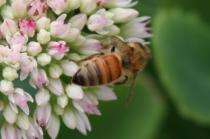Are bees also addicted to caffeine and nicotine?

A study carried out at the University of Haifa has found that bees prefer nectar with a small concentration of caffeine and nicotine over nectar that does not comprise these substances at all. "This could be an evolutionary trait intended to make the bee addicted," the researchers say.
Bees prefer nectar with small amounts of nicotine and caffeine over nectar that does not comprise these substances at all, a study from the University of Haifa reveals. "This could be an evolutionary development intended, as in humans, to make the bee addicted," states Prof. Ido Izhaki, one of the researchers who conducted the study.
Flower nectar is primarily comprised of sugars, which provide energy for the potential pollinators. But the floral nectar of some plant species also includes small quantities of substances known to be toxic, such as caffeine and nicotine. The present study, carried out by researchers at the Department of Environmental and Evolutionary Biology and the Department of Science Education at the University of Haifa-Oranim, headed by Prof. Ido Izhaki along with Prof. Gidi Ne'eman, Prof. Moshe Inbar and Dr. Natarajan Singaravelan, examined whether these substances are intended to "entice" the bees or whether they are byproducts that are not necessarily linked to any such objective.
Nicotine is found naturally in floral nectar at a concentration of up to 2.5 milligrams per liter, primarily in various types of tobacco tree (Nicotiana glauca). Caffeine is found at concentration levels of 11-17.5 milligrams per liter, mostly in citrus flowers. In the nectar of grapefruit flowers, however, caffeine is present in much higher concentrations, reaching 94.2 milligrams per liter. In order to examine whether bees prefer the nectar containing caffeine and nicotine, the researchers offered artificial nectar that comprised various natural sugar levels and various levels of caffeine and nicotine, alongside "clean" nectar that comprised sugar alone. The caffeine and nicotine concentrations ranged from the natural levels in floral nectar up to much higher concentrations than found in nature.
The results showed that bees clearly prefer nectar containing nicotine and caffeine over the "clean" nectar. The preferred nicotine concentration was 1 milligram per liter, similar to that found in nature. Given a choice of higher levels of nicotine versus "clean" nectar, the bees preferred the latter.
According to the researchers, it is difficult to determine for sure whether the addictive substances in the nectar became present in an evolutionary process in order to make pollination more efficient. It can be assumed, however, based on the results of the study, that the plants that survived natural selection are those that developed "correct" levels of these addictive substances, enabling them to attract and not repel bees, thereby giving them a significant advantage over other plants. The researchers emphasized that this study has proved a preference, not addiction, and they are currently examining whether the bees do indeed become addicted to nicotine and caffeine.
Provided by University of Haifa



















